Permanent Rectification: A Never-Ending Journey for the People’s Liberation Army
At a press conference on October 17, China’s Ministry of National Defense disclosed that nine generals had seriously violated CCP discipline. The work-related crimes involved a huge amount of money, and the CCP decided to expel them from the party and referred their cases to prosecutor for investigation. Picture source: Depositphotos.
Prospects & Perspectives No. 62
Permanent Rectification:
A Never-Ending Journey for the People’s Liberation Army
By Arthur Ding
At a press conference on October 17, China’s Ministry of National Defense spokesman Senior Colonel Zhang Xiaogang (張曉剛) disclosed that nine generals had seriously violated Chinese Communist Party (CCP) discipline. The work-related crimes involved a huge amount of money, and the CCP decided to expel them from the party and referred their cases to prosecutor for investigation. Ratification of the expulsions will await the incoming plenary Central Committee meeting. Earlier, the Central Military Commission (CMC), the highest military organ in China, had decided to expel the nine generals from the military.
The nine generals are He Weidong (何衛東), CMC Vice Chairman; Miao Hua (苗華), Director of the CMC Department of Political Work (DPW); He Hongjun (何宏軍), Standing Vice Director of the CMC DPW; Wang Xiubin (王秀斌), Standing Deputy Director of the CMC Joint Operation Commanding Center; Lin Xiangyang (林向陽), Commander of the People’s Liberation Army (PLA) Eastern Theater Command; Qin Shutong (秦樹桐), Political Commissar of the PLA Army; Yuan Huazhi (袁華智), Political Commissar of the navy; Wang Chunning (王春寧), Commander of the Chinese People’s Armed Police Force; and Wang Houbin (王厚斌), Commander of the PLA Rocket Force.
As expected, in the communiqué released by the CCP on October 23 after the fourth plenary CC meeting, the verdicts against the generals were formally confirmed. The communiqué says that the plenary CC meeting ratified the Politburo’s decision expelling them from the party. The communiqué also states that General Zhang Shengmin (張升民) is being promoted to CMC Vice Chairman; previously he was the secretary of the CMC Disciplinary and Investigation Commission.
The plenary CC meeting formally concludes the process of Xi Jinping’s political purge against top generals. The nine generals are part of those who have been purged since CCP’s 20th party congress in 2022. These developments have led many observers to ask: What are the problems in China, why have so many generals been purged by Xi, and how will these purges affect the PLA’s morale and operational capabilities?
The PLA as a ‘concession’
China’s political system helps shape the PLA as a “concession.” In China’s party-state system, the PLA is only subordinate to the CCP’s rule; a well-known slogan demonstrates this CCP-PLA relationship: “the absolute leadership of the party over the army” or “the party commands the gun.”
Nevertheless, the question is how to implement this above-stated principle in real practice. The answer is that the expected absolute leadership over the army is in fact empty talk, and ultimately it is the military that leads the military in real practice.
Unlike democratic systems in which ruling parties appoint high-ranking non-uniformed civilian officials to defense sector in order to push the ruling parties’ agenda, and simultaneously defense ministers along with military chiefs of staff have to answer to parliamentary institutions, the CCP never sends civilian non-uniformed staff to the PLA to run party affairs in the military.
The only non-uniformed person from the party to lead the PLA is the party’s General Secretary, who concurrently serves as CMC chairman. Another non-uniformed person from the party to serve in the military only plays a staff role. The most typical case under Xi is LTG Zhong Shaojun (鍾紹軍) who reportedly followed Xi when Xi served as party boss in Zhejiang Province. As Xi ascended to become the party general secretary and CMC chairman, Zhong was transferred to the CMC, where he served as director of the CMC central office and the CMC chairman’s office. In other words, only two officials from the party are in the military while the rest are all uniformed military officials who run party affairs. This means that the military leads the military in real practice.
The media play no role in all this. Under extremely tight controls by the state, Chinese media never report wrongdoings in the military; rather, media outlets always report positive news about the military, ranging from progress in armament development to political allegiance paid by all soldiers to Xi and to the party.
In the end, the military is like a “concession” in China’s political system. The party’s absolute control is left to only one single person — the CMC chairman — who in turn completely counts on uniformed military officials to run party affairs in the military. It is therefore easy to imagine that this concession status will nurture corruption and that corruption will always hang over the military.
The post-Xi era and factionalism
Corruption charges alone are probably not sufficient to explain the purge. It is very likely that faction building in the context of Xi’s health and related political succession matters more.
There have been several rumors about Xi’s health. A typical case was his visit to South Africa in August 2023 to attend the BRICS summit. His absence at a business forum on the sidelines of the summit, added to the fact that his statement was read by Minister of Commerce Wang Wentao (王文濤), gave rise to speculation. And it is inevitable that speculation over the state of Xi’s health will trigger a political succession issue.
A WeChat official account reportedly run by the CMC DPW disclosed four accusations against Miao Hua. The first in order was that Miao had publicly talked about absolute loyalty, but that privately he was doing tuan tuan huo huo (團團伙伙). In CCP’s political terminology, tuan tuan huo huo is extremely negative, indicating that someone is building a political faction.
It should be pointed out that there is no way to verify the authenticity of the above accusation. Nevertheless, it is reasonable to speculate that if Xi’s health is indeed deteriorating, political succession will be an issue among the CCP’s top elites, and those with political ambition will not sit idle.
The military has played a critical role in Chinese power structure throughout the country’s history. Chairman Mao used to say that political power grows out of the barrel of a gun; many leaders after Deng Xiaoping had to cater to the PLA in order to consolidate their power base. This means that the military acts as a kingmaker shaping the country’s power structure.
Any attempt to build a faction will definitely irritate Xi because there is no sign that he intends to step down. Any such attempt would inevitably frighten other elites as this may imply that their future ascendancy will rely on the military after Xi steps down. Such a scenario would signify a retrogression of Chinese politics to the pre-reform era, in which the military monopolizes power.
The way forward
It is evident that Xi has lost confidence in his top generals. Although General Zhang Shengmin was promoted to CMC Vice Chairman, he was not granted Politburo member status as his predecessors. Admiral Dong Jun remains as Defense Minister, but has not been granted CMC standing member status. And many important vacancies, such as the position of director of the CMC DPW, remain vacant.
Xi should know that the PLA is a concession in China’s political system. He also should understand the potential consequences of his health issues. What he can do to maintain his power over China’s political system is to frequently launch permanent rectifications so that generals are reminded to steer clear of corruption and remain atomized.
What are the implications of all this for the PLA’s capability development? Rumors abound that at present, priority within the PLA has been placed on boosting political education, although there is no detailed information about this possible shift. Immediately after the June 4, 1989, crackdown, the PLA reportedly spent 60% of its time on political education. If this is true, more recent moves in that direction will affect PLA training in the short term.
Furthermore, because corruption in the PLA has been so rampant, internal control and oversight may be tightened at all levels. This implies lower efficiency and a growing aversion to change. This in turn could undermine new initiatives because new initiatives, which always involve reallocation of resources and interests, could engender suspicion.
Nevertheless, China will remain vigilant and keenly aware of the evolving situation in the Indo-Pacific region. At the same time, the defense budget will likely continue to grow despite China’s slow economy, as Xi believes that fierce competition with the U.S. over military capabilities, among other things, will be a critical factor shaping the potential outcome of the contest between the two superpowers.
(Dr. Ding is Professor Emeritus, National Chengchi University.)


